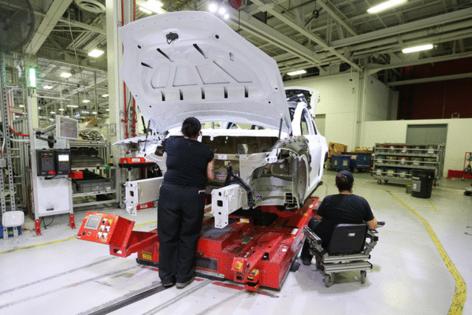Tesla settles lawsuit by Black worker who alleged widespread racism at Fremont electric car factory
Published in Business News
Tesla has settled a lawsuit by a worker in its Fremont electric car factory who claimed she was harassed and discriminated against because she is Black.
Raina Pierce sued the automaker in 2022, alleging that her manager referred to the facility as “the plantation” and the “slave house,” and that her supervisor called her a racial slur that was pervasive in the factory. Pierce still worked at Tesla when she filed her lawsuit, but has since left the company, her lawyer said Monday.
Tesla, led by CEO Elon Musk, did not immediately respond to a request for comment.
Pierce’s case, first filed in Alameda County Superior Court and moved the next month to San Francisco U.S. District Court, is one of several claiming widespread, anti-Black racism at the Fremont plant. Two are scheduled to go to trail in September.
Terms of the settlement were not disclosed in the court filing Friday about the agreement. Pierce’s lawyer Hunter Pyle said the settlement was confidential. The deal followed court-ordered arbitration that started in March 2023, and mediation in October 2024 that concluded early this month in the agreement, according to an earlier court filing.
Pierce had claimed that when a manager noticed she had been assigned to push two carts that were too heavy for one person, and notified her direct supervisors, one of them angrily claimed she got him in trouble, and later made a vulgar comment about not being able to tolerate Black people. Pierce’s supervisors let non-Black workers swap work stations regularly, but denied her requests to switch stations, and also disciplined her more frequently and severely than non-Black colleagues, the lawsuit claimed.
Pierce had reported alleged harassment and discrimination to Tesla’s human resources department in May 2021, after she had begun, a month before, to feel a sharp pain in her left knee and lower leg that was made worse by standing for long periods, walking long distances or carrying heavy items, the lawsuit said. A few months later, suffering from the leg pain and an infection, she called out sick and was told she was being put on leave, the lawsuit claimed.
Tesla, in addition to discriminating against her on the basis of race and gender, and failing to stop the alleged race-based harassment, retaliated against her by making her stay on leave for more than three months, the lawsuit alleged. She was seeking unspecified general, punitive and compensatory damages.
The car maker continues fighting a number of legal actions claiming it failed to properly address anti-Black racism in its facilities.
California’s Department of Fair Employment and Housing — the state’s civil rights regulator — filed suit against Tesla in 2022, alleging Black workers at the company’s Fremont facility were paid less than White workers, denied advancements, and faced daily racist abuse, including a noose drawn in a bathroom next to a lynching reference and a racial slur. Tesla has called the lawsuit, in Alameda County Superior Court, “misguided” and “unfair.” The case is set to go before a jury Sept. 15.
In the widest-ranging ongoing racism case against the pioneering EV company, hundreds of current and former Black workers for Tesla filed declarations supporting a 2017 class-action lawsuit by former Tesla contractor Marcus Vaughn, alleging that despite complaint after complaint, the company did not stop race-based abuse and discrimination, with Black workers segregated into the hardest, most dangerous, lowest-paid jobs and subjected to a barrage of racist treatment, language and images. Thousands of current and former Black workers at Tesla have signed on to the lawsuit.
Tesla said in a 2022 blog post that it “strongly opposes all forms of discrimination and harassment” and claimed it “has always disciplined and terminated employees who engage in misconduct, including those who use racial slurs or harass others in different ways.” The judge in the case, Noël Wise, said last year that the experiences of workers who submitted declarations “might reasonably be characterized as race harassment.” A jury trial in the Vaughn case is scheduled to start Sept. 8 in Alameda County Superior Court.
In 2021, a San Francisco federal court jury awarded a Black former Tesla worker, Owen Diaz, almost $137 million after he sued the company over alleged “daily racist epithets” in a workplace where colleagues drew swastikas and left racist graffiti and drawings around the facility. San Francisco U.S. District Judge William Orrick later cut the award to $15 million, saying “disturbing” evidence supported the verdict against Tesla, but legal principles compelled him to slash the payment. Diaz rejected the award in favor of a new trial, where a jury found that Tesla should pay $3.2 million. After Diaz filed a court notice that he would appeal, he and Tesla reached a confidential final settlement in March 2024.
In May, an arbitrator ordered Tesla to pay $1 million to Melvin Berry, a Black former Tesla factory worker called racial slurs by supervisors.
The U.S. Equal Employment Opportunity Commission sued Tesla in 2023, accusing the company of “tolerating widespread and ongoing racial harassment of its Black employees and … subjecting some of these workers to retaliation for opposing the harassment.” Tesla in a court filing claimed the lawsuit arose from “run-amok competition” between the commission and the California civil rights regulator, and that it lacked “any sound factual basis.” The next hearing in the case is scheduled for June.
©#YR@ MediaNews Group, Inc. Visit at mercurynews.com. Distributed by Tribune Content Agency, LLC.












Comments